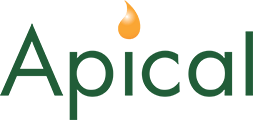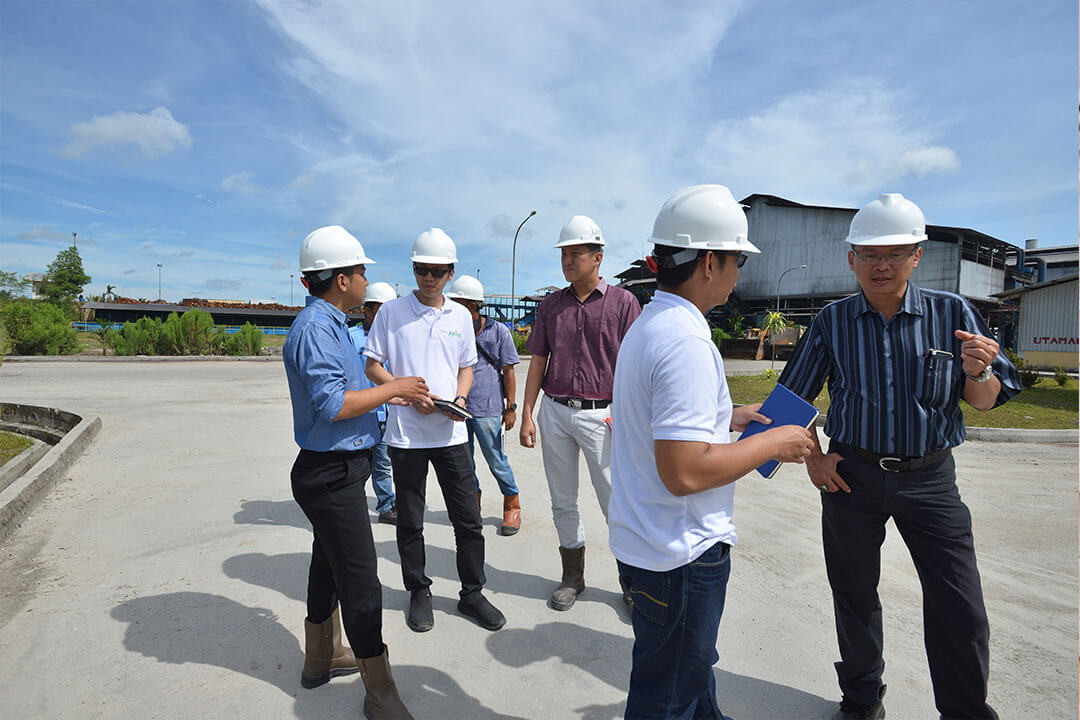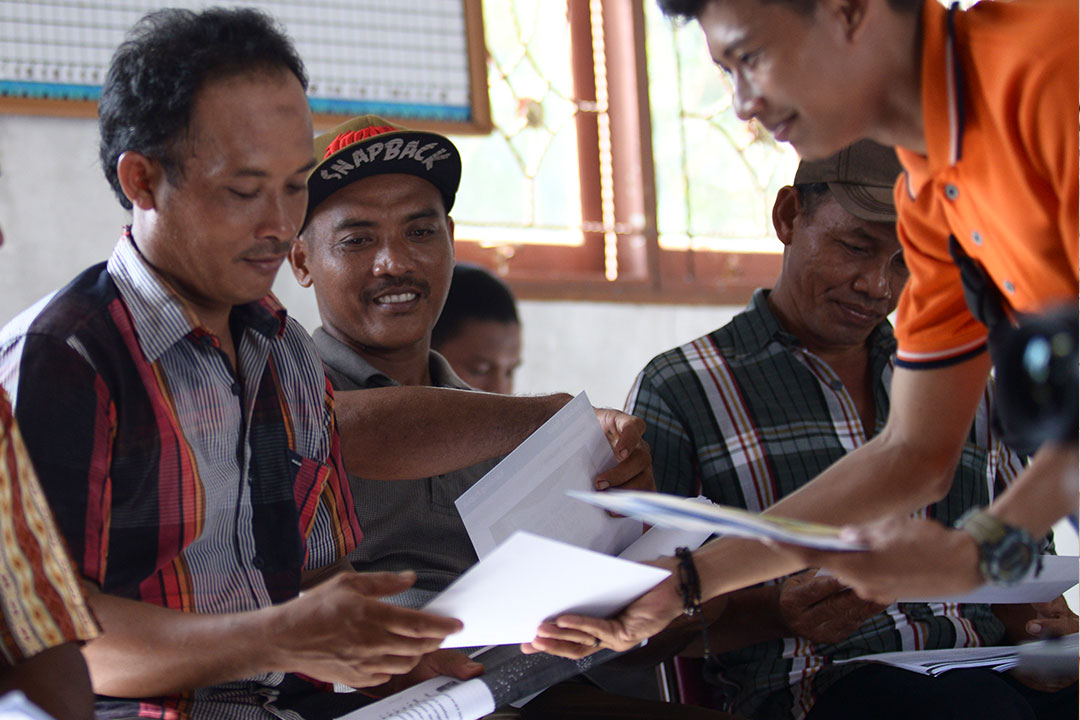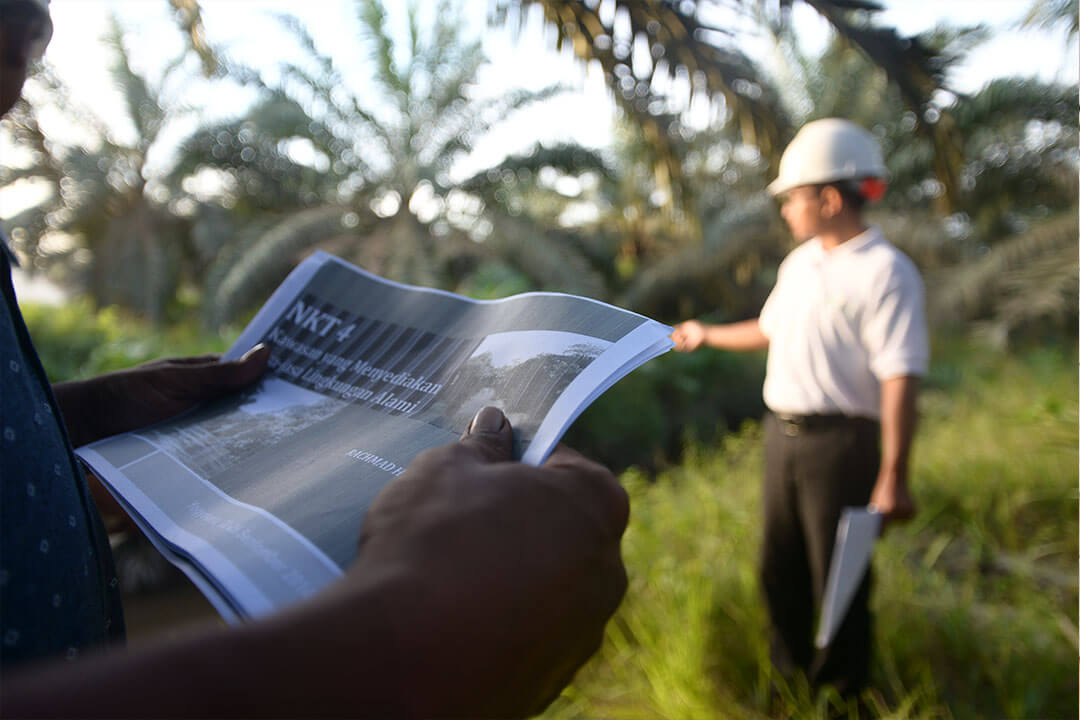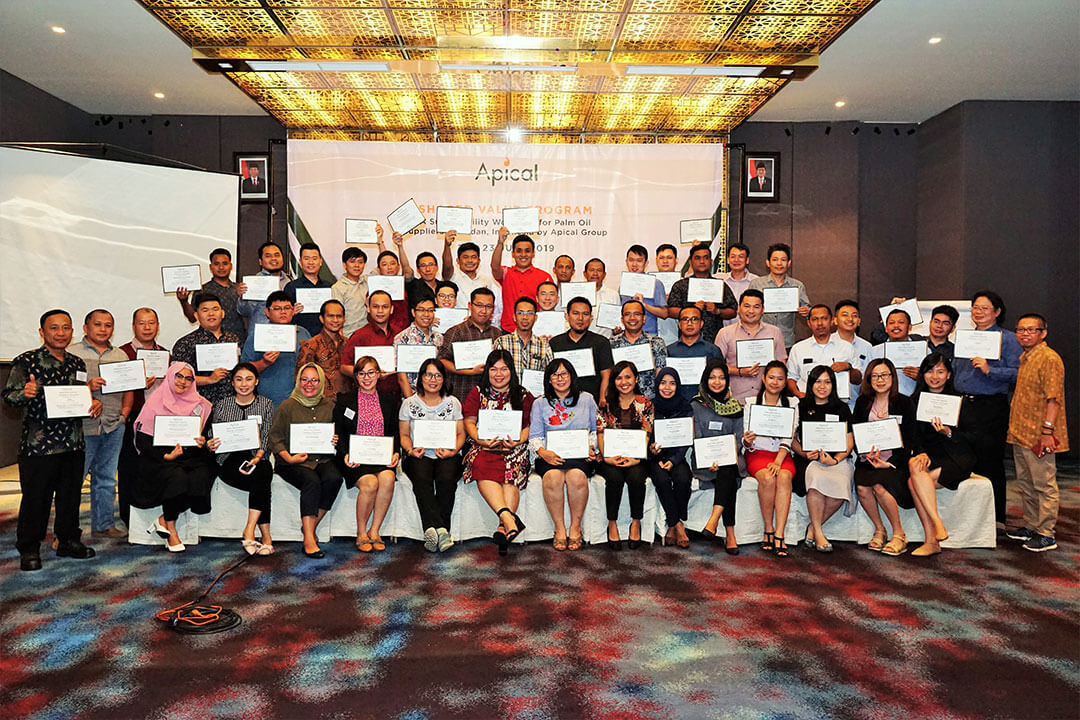We recognise the importance of establishing a tailored approach to communicating with our wide spectrum of stakeholders. Our commitment to sustainability extends throughout our supply chain. We engage with suppliers before and after they are integrated into our supply chain because we believe that our sustainability goals cannot be achieved in isolation and require the collaboration of all stakeholders. Suppliers, in particular, are our focus to transforming the industry and ensuring palm oil is produced sustainably.
Priority in engagement is given to long term suppliers or those who sell us large quantities of raw materials. However, smaller suppliers who are willing to adopt more responsible practices are also given equal priority to enter our sustainable supply chain.
For suppliers, we conduct regional workshops that spur discussions on incorporating sustainability and traceability as part of their quality management system. The engagement process involves visits to the mills and estates to identify areas for improvement needed to adhere to Apical’s Sustainability Policy commitments and global standards.
Apical has developed a Sustainability Implementation Framework (A-SIMPLE Framework) to ensure effective implementation of our policy in bringing suppliers on our sustainability journey. We report the risk level of all our mills on an annual basis.
Potential Suppliers
Apical has a Sourcing Policy with a clear set of criteria of what we consider as responsible sourcing. Potential suppliers are evaluated based on a full review of their company profile and their ability to present official licenses and/or permits that meet legal requirements. All new suppliers must provide information of their sustainability practices as well as the level of traceability within their operations.
Apical’s suppliers are required to comply with our Sustainability and Sourcing policies – we emphasise this within the terms and conditions of our commercial arrangement. Apical ensures the commitment to ethical conduct and prohibition of corruption is abided by their suppliers through the Code of Procurement Ethics (COPE).
Active Suppliers
Once suppliers are contracted into our supply chain, we continue to pro-actively engage with them to monitor policy compliance and facilitate continuous transformation towards sustainability. We have developed useful guidelines on topics such as:
- Prevention, early detection and control of open-burning in oil palm plantations
- Drainability Study Prior to Replanting on Peat
- Free, Prior and Informed Consent (FPIC)
Our KPIs to ensure all suppliers comply with our Sourcing Policy:
- All suppliers must commit to Apical Sustainability Policy
- Suppliers must be fully traceable within 1 year of doing business with Apical
- All suppliers to be NDPE compliant by 2025
- Suppliers must cooperate with Apical on any grievance matters within the stipulated timeline in accordance to Apical’s Grievance Protocol.
Non-Compliant Suppliers
Apical does not knowingly source from non-compliant suppliers such as those that engage in illegal activities or violate community rights. We have established the Apical Grievance Procedure – a formal process to address grievances – for our stakeholders to raise concerns related to our business or suppliers.
The Apical Grievance procedure covers all these activities: recording of grievance; verifying claims; rectifying confirmed claims; reporting the results and actions taken; and delivering official responses to stakeholders whilst monitoring and managing follow-up actions.
For any proven violations, suppliers are required to provide a concrete corrective action plan with clear timelines. Failure to respond and commit towards remedial action triggers a suspension of contracts until progress has been made or the issue has been resolved. Apical reserves the right to cease transactions with all suppliers who have repeatedly violated our sustainability commitments.
Anchor Programmes
While traceability allows us to identify and map our suppliers all the way up to the plantation level, prioritisation and engagement with suppliers is crucial to ensure that the commitments and standards set out in our Sustainability Policy are met. Apical engages with suppliers through our flagship Anchor programmes to facilitate the adoption of more sustainable practices.
Check our progress dashboard to learn more about our achievements from these Anchor programmes.
Mill Prioritisation Process (MPP)
The MPP is a risk-based approach used to identify priority mills for deeper engagement. The process involves analysing geospatial and non-spatial parameters to identify potential sustainability risks associated with the supplying mills. Geospatial parameters identify risks linked to fire, deforestation, protected areas, and peatlands within a 50km radius of a supplying mill.
Non-spatial parameters focus on identifying issues related to communities, environmental, social, legal, and ongoing grievances that may occur in a mill’s FFB supply chain, based on publicly reported information from sources such as the media and external reports. High-impact suppliers that have long-term business relations with Apical are also prioritised for engagement. All of our suppliers are assessed under the MPP. Risk levels are updated monthly based on the parameters of the MPP.
Priority Supplier Engagement Programme (PSEP)
We engage with our suppliers through desktop and field verification to facilitate their compliance with our Sustainability and Sourcing Policy via various initiatives under our Anchor Programme. To ensure their compliance, we verified the information gathered based on a set of ESG related checklist via the PSEP programme. PSEP is a deep dive supplier engagement process involving 5 days field visit to each site including plantations, dealers and cooperatives. Additionally, we also conduct verification of NDPE Compliance of our suppliers through the NDPE IRF model conducted by external verifier, Peterson Control Union.
The PSEP assesses our high-risk suppliers, prioritised through the MPP, on their level of compliance with our Sustainability Policy and other industry standards. The assessment focuses on six key guiding principles. For suppliers in the PSEP, we will conduct field visits which allows us to have personal interaction and more effective communication. Deeper engagements facilitate a better understanding of our suppliers, provide new insights into their practices, and help to identify gaps for improvement.
The most common social issues identified include land conflicts resulting from the lack of Free Prior Informed Consent (FPIC) between the company and communities and the absence of clear land boundaries being defined. From an environmental perspective, most issues are centred on water and air pollution from the milling process. Deforestation and biodiversity issues are also identified and linked to mill operations.
Through our engagements, we provide detailed guidance on developing Standard Operating Procedures (SOPs) and sustainability management systems. After the PSEP visits, we continue to maintain a proactive relationship with these suppliers to ensure that action plans have been implemented and provide further assistance where required.
The PSEP is an ongoing process and while we aim to visit all the identified potential high-risk mills, our target is a minimum of 10 mills annually. Through our MPP and PSEP, we are able to minimise risks associated with our supply chain.
The assessment focuses on six (6) key guiding principles:
Traceability Outreach Programme (TOP)
Launched in 2017, the TOP is designed to provide knowledge and simplified solutions for the suppliers of our refineries on how to collect and manage the traceability data of their FFB suppliers. This programme takes an “outside-in” approach where suppliers are seen as co-contributors of solutions to make the industry more traceable.
This programme also has the ambition to verify and incorporate the data collected to build an interactive mapping platform to assist suppliers identify and manage landscape level issues based on the location of their FFB source.
Collaborative Action Remote Engagement (CARE)
We engage with our suppliers through desktop and field verification to facilitate their compliance with our Sustainability and Sourcing Policy via various initiatives under our Anchor Programme. As a solution to overcome challenges of travel restrictions during the pandemic, we launched the CARE programme in 2020 as an extension to PSEP to ensure continuous verification of supply chain effectively. Through CARE, compliant information collected from suppliers will be assessed, to determine their compliant level and associated risks in the supply chain. Suppliers compliance level will be verified against Apical’s Sustainabiltiy Policy, industry standards, and in fulfilment to NDPE IRF requirements. The supplier engagement and verification is performed remotely. Following the verification, Apical supports suppliers through agreed action plan for implementation.
Additionally, we also conduct verification of NDPE Compliance of our suppliers through the NDPE IRF model conducted by external verifier, Peterson Control Union.
Online Verification → Review Document → Action Plan → Implemented and Follow-Up
Suppliers Self-Assessment (SFA)
A key component of the Apical Sustainability Policy is our commitment to NDPE which also applies to our suppliers. To ensure that NDPE practices are in place and risks within our supply chain are identified, Apical has developed the SFA tool to help our suppliers assess their own operations’ compliance with the requirements.
In 2019, we conducted a trial with some of our big and medium suppliers, as well as suppliers who only operate mills to test the usability of the tool. After the one-month trial and based on feedback obtained, we rolled out the SFA for all our suppliers who are required to fill up a questionnaire to identify gaps in practices against our Sustainability Policy commitments and areas of support needed to close those gaps. Where gaps are identified, we will then engage these suppliers through our PSEP and SVP programmes.
Shared Value Programme (SVP)
In partnership with Earthworm Foundation, Proforest and Daemeter, we deliver workshops through our SVP for our priority suppliers on a selection of topics that take into account regional issues specific to the location of suppliers. The SVP covers the latest market trends and benefits of international certification schemes such as RSPO and ISCC.
Participants gain insights into the importance of palm oil traceability and responsible sourcing. They are also updated on Indonesia’s regulations on peat, mill operations and plantations, as well as High Conservation Value (HCV) and High Carbon Stock (HCS) requirements. Industry subject matter experts from RSPO, Earthworm Foundation, Proforest, Daemeter, ISPO and Setara Jambi have previously shared practical knowledge and experience on these topics.
Aside from presentations by industry experts and partners, this programme promotes active discussions whereby suppliers take ownership of some of the solutions. We remain committed to conducting at least two workshops annually at different provinces in Indonesia. We introduced a Responsible Sourcing Manual (RSM) to our participants which aims to translate Apical’s Sustainability Policy into tangible and practical steps for implementation. The manual was published in 2018 and has been distributed to all our suppliers.
Supply Chain Monitoring
The trends demanding for transparency drives innovation through technology, especially satellite data-driven solutions to help make supply chains more transparent and traceable. Real-time satellite imagery provides information on risk and performance and most importantly, it is reliable.
Apical believes a good understanding of the complexity of an effective oil palm monitoring is necessary to demonstrate our commitment to ensuring sustainability in the entire supply chain as outlined in our Sustainability Policy. We use satellite imaging technologies and tools to reach the target of deforestation-free supply chains and to identify the source of our palm oil, covering various estates and plantations.
How are we using satellite monitoring
When our Sustainability team monitors our supply chain and receive deforestation notifications through monitoring applications, we engage with our direct suppliers linked to the mills within the area where the alert was detected. The engagement enables Apical to understand if the alert has direct link to our supply chain.
When identifying risks within our supply chain, our team will examine and analyse the database consisting all our suppliers using a methodology known as Mill Prioritisation Process (MPP) that was introduced in 2016.

The development and complexity in sustainability management spurred Apical’s sustainability team to develop a more in-depth MPP analysis. In 2019, Apical collaborated with a consultant and held a refresher training programme to equip Sustainability team members with skills and knowledge, covering various topics including an introduction of new parameters for risk assessment. Through MPP, we examine our integrated and commercial mills in two aspects – spatial and non-spatial data.
Spatial parameters identify risks linked to deforestation rate, peatlands area, forest area status, Key Biodiversity Area, legal protected area and fire hotspots within a 50km radius of a supplying mill, while non-spatial parameters examines suppliers’ certifications such as RSPO and ISPO, NDPE compliance, and its publicly reported information covering social, environmental and legal aspects in the last three years. We assess all our suppliers under the MPP.
High-risk suppliers will be identified and are required to undergo an in-depth engagement through our Anchor programmes. For a start, all our suppliers are required to fill up the Suppliers Self-Assessment (SFA) questionnaire where we can identify their gaps in practices against our Sustainability Policy commitments and areas of support to address these gaps. Subsequently, we will engage these suppliers through Priority Supplier Engagement Programme (PSEP) and Shared Value Programme (SVP). Visit our Anchor Programme page to find out more.
Our Sustainability team monitors all suppliers periodically through Earthqualizer Deforestation Alert Report and Apical Deforestation Supply Chain Alert (ACTION) Report. The ACTION Report is derived from the results of the verification using monitoring applications to identify and/or detect alleged deforestation in our supply chain.
Apical’s Grievance Secretariat (GSR) that consists of personnel from the Group’s Sustainability team is tasked to assess, monitor and identify potential grievance issues within our supply chain through grievance alerts and different monitoring systems.
Should we receive a grievance allegation against any of our suppliers, the GSC will acknowledge receipt of the allegations to the whistle blowers or grievance raisers within five working days. This triggers a series of investigations and preliminary fact-finding activities to establish relevance and evidence of compliance in accordance to Apical Group policies.
In case of absence of clearly documented and verified evidence, the Supplier Engagement Team (SET) shall demand for clarification and evidence of compliance from the supplier, which shall be provided within three weeks from the date of the Request for Clarification letter (RFC).
If the clarification and evidence of compliance is not satisfied, the SET will demand for a physical meeting with the supplier’s management and conduct further grievance verifications as necessary.
In cases of serious violations – with documented and verified evidence of clearing forest, legally protected areas and peatland – GSR will require the supplier to immediately stop land clearing on all affected concessions as a prerequisite for continued engagement and support for a grievance resolution. This will be in effect pending further assessments or remedial actions. Learn more about our Grievance Process and Supplier Engagement Protocol here.

